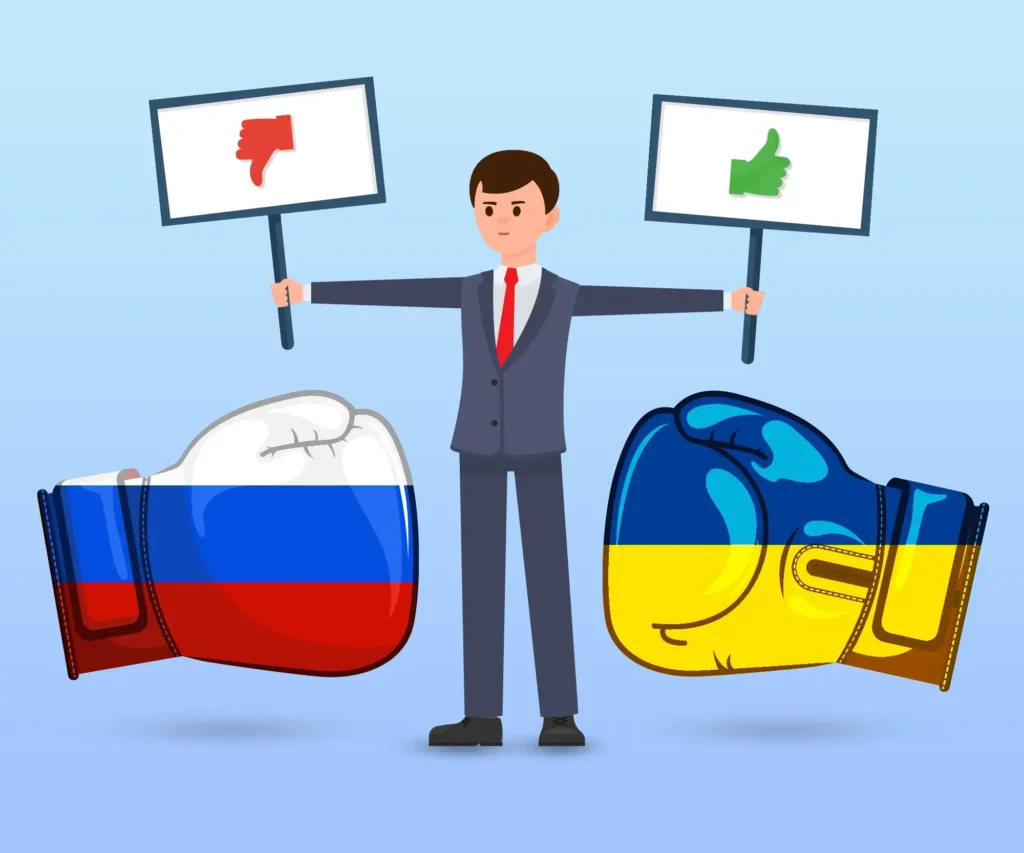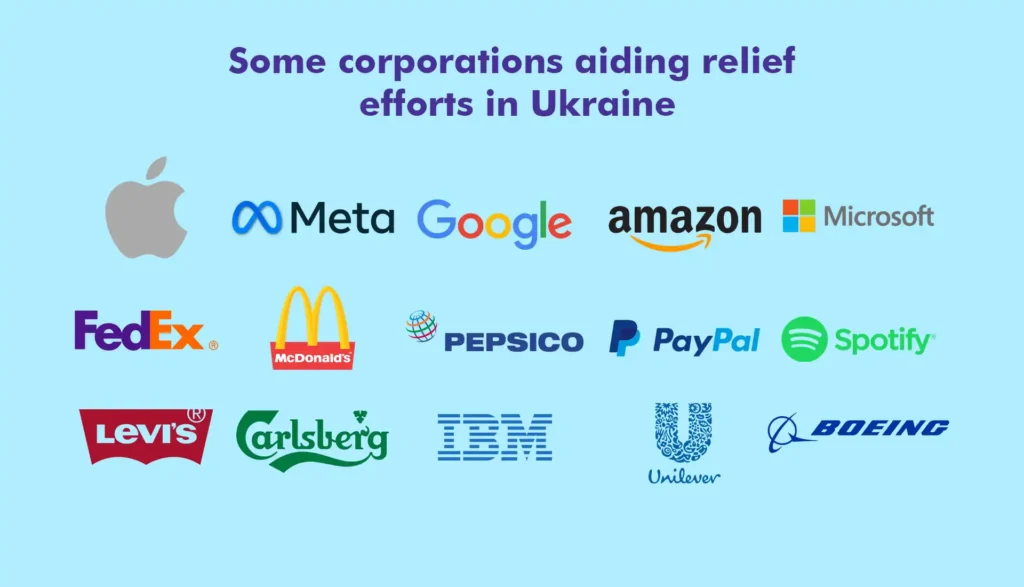
Russian President Vladimir Putin launched a full-scale invasion of Ukraine in the early hours of February 24. Since the Russia-Ukraine conflict began, 5 million Ukrainians have left their country and 7.1 million are dispersed within the country. In light of the ongoing conflict, tech giants and massive conglomerates have difficulty continuing with a “business as usual” strategy. Due to the impact of the war on the market-driven economy and the various stakeholders—governments, clients, clients that are governments, etc.—a neutral position has not been a viable option for the business world. This raises the question: which companies are assisting in relief and aid efforts in Ukraine? What are the implications of this apparently noble move? Let’s delve right into what corporations are doing about the Russia-Ukraine conflict.
Relief efforts of the kingpins of the tech world
1) Apple
Apple went out of its way to halt all sales and exports to Russia. CEO Tim Cook also announced that Apple would donate to humanitarian efforts. In their bid to collect donations, they declared that they would match their employees’ contributions at a rate of two to one. Apart from this, Apple has added a donation button to their website, with all proceeds collected going to UNICEF USA.
2) Meta
Meta is blocking ads from Russian state media to ensure that the Russians cannot monetise content. They have also announced that they will considerably restrict access to Russian state-run channels Sputnik and RT across the European Union. Moreover, to ensure that the privacy of Ukrainian citizens is protected, Instagram is also end-to-end encrypting all the Instagram direct messaging exchanges in Ukraine. As of March 18, 2022, Meta raised $40 million across its platforms in terms of donations.
3) Microsoft
Microsoft has pledged over $35 million to support humanitarian assistance and relief efforts for Ukraine. Microsoft Disaster Response teams also have extended support to assist groups assisting Ukraine. Apart from this, Microsoft has suspended sales and services in Russia.
4) Google
Google is making a total contribution of $15 million. They are supplying both donations and support in kind for the cause. The organisation is also forwarding advertising credits worth $5 million towards humanitarian and intergovernmental setups. In addition to this, YouTube (owned by Google) has blocked channels associated with Russian media in the EU. Google also launched an SOS alert on its ‘Search’ across Ukraine that grants easy access to UN resources for people seeking refugee and evacuation information. Additionally, Google Maps now shows refugee and migrant centres in neighbouring countries.
Contributions of other corporate bigwigs
1) Amazon
Amazon is working with NGOs and employees to offer immediate support to the people of Ukraine. As of April 22, Amazon has made a collective donation of $35 million, including contributions to UNICEF, the World Food Programme, Red Cross, and Save the Children. This joint donation also includes additional contributions made by its internal team, matched by Amazon. In addition, the e-commerce giant has added donation links on its US website’s page, waiving payment processing fees for customers.
2) FedEx
FedEx provided more than $1.5 million in humanitarian aid. This contribution includes $1 million for in-kind shipping to organisations transporting supplies into Ukraine and $550,000 in cash donations to non-profit organisations.
3) Starbucks, McDonald’s, PepsiCo, and other big chains
Starbucks has shut down 100 of its stores in Russia. Likewise, McDonald’s closed down 850 of its food joints across Russia in response to the Russian invasion. Ronald McDonald House Charities (RMHC) in Ukraine is partnering with local hospitals throughout the country. The PepsiCo Foundation has donated $4 million to the Red Cross, World Vision, the United Nations World Food Programme, World Central Kitchen, and Save The Children to aid relief efforts. Coca Cola has shut down operations in Russia for the time being.
4) The oil and gas juggernauts
Companies in the energy sector that have either divested from or considerably ceased operations in Russia include BP plc, Shell Plc, Equinor ASA, and TotalEnergies SE. Similarly, several other companies like Paypal, Spotify, Levi Strauss, Carlsberg, IBM, Unilever, and Boeing have also thrown their weight behind this cause. While some have made monetary pledges, others have helped by either halting business with or services to Russia. The rest are helping bolster Ukraine’s abilities.
Some political commentators are keen to point out that these relief efforts could be forms of self-glorification and tokenism. The commentators argue that besides altruistic intent, these multi-million dollar gestures also help the image and popularity of these companies. Moreover, business experts remark that the pull-out from the Russian market has a domino effect. Due to the intertwined nature of large corporations, when one company suspends operations, it makes little sense for others to continue.

Impacts of relief efforts
With donations worth over $200 million, these corporate giants have jumped with both feet into this international geopolitical conflict. Their entanglement in this war has made them a force that could significantly impact how nations wage wars—and negotiate peace—in the future. According to Juan Zarate, a senior advisor at the US think tank Centre for Strategic and International Studies, one sure outcome is that this war will cut Russia off from Western influence more than ever. While the experts predict this will end positively due to Russian isolation and the resulting end of the war, many in the West are also concerned about the growing Russia-China relations.
Selective outrage?
The Russian invasion of Ukraine elicited a strong reaction from the West. Western countries and with them, giant corporations invoked sanctions, began welcoming refugees, and vocally supported Ukraine’s resistance. Yet, as many in the Middle East have observed, this outrage has been blatantly selective and hypocritical. Bombings in Syria, Yemen, and other regions in the MENA region coincided with the war in Ukraine. This double standard of big businesses has caused many to express disgust over their inaction toward long-term humanitarian crises in the Arab world. While the generosity of these multinational companies has helped scores of displaced and injured Ukrainians, the European exceptionalism they reinforce is equally troubling.
Blowback from employees belonging to diverse backgrounds is also an expected outcome of this selective outrage. CEOs and boards now contend with the question of whether corporations are willing to do business based on moral considerations. If yes, why are these companies prepared to make a stand on behalf of Ukrainians but not for Uighurs, Rohingya, Palestinians, or other oppressed peoples?
Note: All figures listed as donations above are in US dollars.


